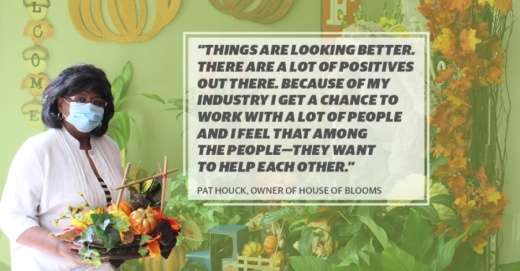Still, Houck said the slowdown is nothing the businesses will not be able to weather.
“Things are looking better,” Houck said. “There are a lot of positives out there. Because of my industry I get a chance to work with a lot of people, and I feel that among the people—they want to help each other.”
While the effect of the coronavirus on cities’ sales tax revenue has varied throughout the Houston region—with Sugar Land consistently seeing lower revenue compared to the same months a year ago and Missouri City seeing increased revenue—small businesses in the community have felt the financial strain of the pandemic for the past seven months.
“Local government is only as strong as the local economy,” said James Thurmond, a former city manager and current graduate professor in public administration at the University of Houston. “[If] they don’t have money coming in, they can’t provide some of the basic services they need to provide.”
Sales tax turbulence
The pandemic’s effect on sales tax revenue in Sugar Land and Missouri City has varied. Sugar Land saw sales tax revenue down between 8% and 22% from March through August compared to the same months last year. Missouri City’s allocation fluctuated between down 1% to up more than 14% during the same period. Missouri City City Manager Odis Jones said the city is attributing the increases in sales tax revenue to residents who might be working from home during the pandemic choosing to shop closer to home.
“If there is a bright spot, it’s that folks staying home and shopping leads to different degrees of vitality not only for businesses here in Missouri City, but also to the city,” Jones said.
Jennifer Brown, Sugar Land’s director of finance, said although the city’s sales revenue is still down, the effects have not been as bad as the city originally projected.
“I can’t really speak about consumer behavior and what has changed,” Brown said in an email. “But our main impacts have been seen in retail, and food and entertainment, which have been impacted by the pandemic through state restrictions and changes in discretionary spending habits due to uncertainty in the economy.”
Sales tax revenue is just one component of a city’s budget. Many local governments also collect property taxes, and these values take much longer to change than sales tax revenue does in the midst of an economic crisis, Thurmond said. If sales tax revenue decreases and property taxes remain relatively unchanged, for example, expenditures would need to be cut elsewhere in a local budget, he said.
For fiscal year 2019-20, sales tax revenue is projected to account for 39.5% of the city of Sugar Land’s total revenues. In Missouri City, it is projected to account for 18.5% of the city’s total revenue, according to budget documents.
“Some cities are very dependent upon their sales tax, and some cities aren’t because they don’t get as much sales tax,” Thurmond said.
Business burdens
Despite Missouri City’s sales tax showing growth, restaurants such as Sugar’s Cajun Cuisine & Bar have seen business levels so low they are not sustainable and have used any reserve funding, owner Darryl Austin said.
Austin said Sugar’s, located in Missouri City’s Township Square, is getting by on “a whole lot of prayer.”
“We were shut down for several months, and we’re just getting back going really,” Austin said. “Business is a fraction of what it was previously, and honestly I’m not quite sure we are going to make it, to be honest.”
One explanation for why local businesses are feeling the brunt of the pandemic despite city sales tax figures is big-box stores—not local businesses—produce the most sales tax revenue, according to city officials.
Allena Portis, Missouri City’s director of financial services, said 46% of the city’s sales tax revenue in 2019 was from retail stores with only 11% from restaurants. For Sugar Land, Brown said traditionally the businesses producing the most sales tax revenue for the city are big-box retailers, big-name clothing stores located at or near First Colony Mall, chain electronics sellers and e-commerce companies.
Livia Fallet and her husband, Mark, own Frogs, Snails and Fairy Tales, an indoor play place for young children and toddlers located at the Telfair shopping center in Sugar Land.
Even after the business reopened in late June, Fallet said revenue is down considerably, and it has been difficult to continue operating, especially because the facility previously served as a gathering place for families and children.
To keep the business’s doors open, Fallet said they have begun requiring online reservations to keep capacity at eight children or fewer. Additionally, parents now have the option to rent out the entire play space to keep family and friend groups together.
“We’re giving the opportunity for some families to have something indoors to do without fearing that [it is] going to be too crowded or dirty,” Fallet said. “I think people are ready to get out of the house.”
At Sugar’s, however, the restaurant eliminated its lunch hours due to revenue losses, Austin said. In addition to people being hesitant to eat out amid the pandemic, Austin contributed some of Sugar’s slowdown to coronavirus-related layoffs and closures.
Despite Gov. Greg Abbott allowing restaurants to open at 75% capacity Sept. 21, Austin said Sugar’s is not filling its dining room to that level.
“The people are not here, the customers,” Austin said. “We’re not even getting close to that.”
Economic forecast
The most severe decreases in sales tax revenue may not have happened yet, and local governments need to brace for those, Thurmond said.
The COVID-19 recession, considered to have started both domestically and globally in late February, is unlike any other recent economic downturn, Thurmond said: It could last much longer than a traditional recession.
“We haven’t hit the low point yet,” he said, adding local governments must spend money and create budgets wisely. “I would not be very positive right now. ... I would be cutting back.”
Both Sugar Land and Missouri City budgeted sales tax revenues and city expenses for the upcoming year conservatively.
“As we have seen with this year’s declines, sales tax can be a very elastic revenue stream,” Brown said in an email. “And while we are still dependent on them we need to be conservative in how we implement the budget this year to be sure that we aren’t overcommitting.”
Historically, Sugar Land and Missouri City see increases in their monthly sales tax revenue in December, reflecting a busy holiday shopping season, one which could give businesses a much-needed boost this year.
Serenity Organics owner Melanne Carpenter said she hopes people getting out to shop and increased foot traffic near the Missouri City CBD store helps boost sales this holiday season.
Carpenter opened Serenity Organics in June during the coronavirus pandemic, a feat she said has affected the business's ability to have public-facing events. And while the store is taking a hit financially, Carpenter said she is chalking some of that up to the pandemic and some of it up to being a new business that sells a still largely unfamiliar product.
“I’m cautiously optimistic,” Carpenter said. “What I’m optimistic about is I’m hearing people talking about shopping local and helping the small businesses. ... I think people will want to buy local things for Christmas presents ... so that’s what I’m hoping.”
Jones said Missouri City leaders plan to use the city’s increase in sales tax revenue as a reminder to residents to continue shopping local even after the coronavirus pandemic ends.
“Even after [the pandemic] is done, we should be offering a different sense of place for the city that encourages people to stay home, shop home and be home, so that’s going to be a part of economic development experience,” Jones said.
Colleen Ferguson contributed to this report.





